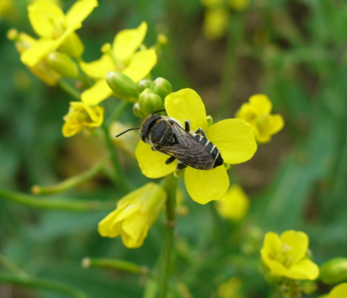Consequences of pollinator availability and effectiveness for pollen transfer in a gynodioecious seed crop system
DOI:
https://doi.org/10.26786/1920-7603(2022)680Keywords:
Apis mellifera, Brassica napus, hybrid seed canola, oilseed rape, Megachile rotundata, pollen depositionAbstract
Pollinator availability and effectiveness are important considerations in plant systems that depend on insect transfer of pollen. In mixed-flower systems (such as dioecious or gynodioecious systems), pollinators may distinguish between morphs, a behaviour which could have negative implications if it leads to reduced cross-pollination. We examined pollinator visitation, response, and effectiveness in hybrid canola seed production, a gynodioecious crop, to understand how pollinator behaviour contributes to cross-pollination between ‘male’ (hermaphroditic) and ‘female’ (male-sterile) morphs. The pollinator types found in these fields differ in visitation rate, size, and pollen load, factors that may affect pollen transfer between plants. The willingness of pollinators to move between male and female flowers can also affect pollen deposition. We used an interview bouquet to present unvisited female inflorescences to different pollinator types visiting male and female flowers to understand behavioural responses to floral morphs and the factors that contribute to better pollination effectiveness. Managed pollinators (honey and leafcutter bees) were far more abundant than wild pollinators in this system. Bees foraging on male flowers were less likely to accept a proffered female flower than those foraging on female flowers. Pollen deposition on stigmas was influenced by pollinator type (female leafcutter bees were the most effective) and increased with time spent on a flower. Pollinators transferring from a male flower to a female flower deposited more pollen than those that originated on female flowers, emphasizing the importance of transfer between male and female morphs. Surprisingly, pollinators carrying more pollen transferred less pollen to recipient stigmas.

Downloads
Additional Files
Published
How to Cite
Issue
Section
License
Copyright (c) 2022 Riley Waytes, Dr. Ralph V. Cartar, Shelley Hoover

This work is licensed under a Creative Commons Attribution 4.0 International License.
JPE is an open access journal which means that all content is freely available without charge to the user or his/her institution.
Authors who publish with this journal agree to the following terms:
1) Authors retain copyright and grant the journal right of first publication with the work simultaneously licensed under a Creative Commons Attribution License that allows others to share the work with an acknowledgement of the work's authorship and initial publication in this journal.
2) Authors are able to enter into separate, additional contractual arrangements for the non-exclusive distribution of the journal's published version of the work (e.g., post it to an institutional repository or publish it in a book), with an acknowledgement of its initial publication in this journal.
3) Authors are permitted and encouraged to post their work online (e.g., in institutional repositories or on their website) prior to and during the submission process, as it can lead to productive exchanges, as well as earlier and greater citation of published work (See The Effect of Open Access).
To assure a broader targeted audience, content will be included into databases (such as EBSCO) and directories (such as DOAJ).











